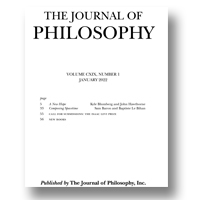|
|
|
1.
|
The Journal of Philosophy:
Volume >
111 >
Issue: 11
Anja Karnein
Putting Fairness in Its Place: Why There Is a Duty to Take Up the Slack
abstract |
view |
rights & permissions
| cited by
The view that agents are not obliged to do more than their initial fair shares when their fellow duty bearers fail to comply has prominent defenders, including Liam Murphy and David Miller. While Murphy thinks that asking agents to take up other agents’ slack would be unfair, Miller claims that slack-taking cannot be required because primary responsibility does not migrate from noncompliers to compliers. This paper argues, by contrast, that there are a number of circumstances in which there is a duty to take up the slack even though it is unfair and even though responsibility stays where it is. The central claim is that what agents owe to third parties is a separate issue from how they relate to fellow duty bearers. This proposal also runs counter to familiar defenses of slack-taking that weigh its unfairness against the moral importance of the interests at stake for third parties.
|
|
|
|
|
|
|
2.
|
The Journal of Philosophy:
Volume >
111 >
Issue: 11
Robert Pasnau
Veiled Disagreement
abstract |
view |
rights & permissions
| cited by
A theory of how rationally to respond to disagreement requires a clear account of how to measure comparative reliability. Such an account faces a Generality Problem analogous to the well-known problem that besets reliabilist theories of knowledge. But whereas the problem for reliabilism has proved recalcitrant, I show that a solution in the case of disagreement is available. That solution is to measure reliability in the most fine-grained way possible, in light of all the circumstances of the present disagreement, but behind a veil that precludes taking into account which views are one's own. This resolves two of the leading obstacles to understanding what disagreement rationally requires: the objection from neglecting the evidence, and the objection from absurd disagreements. Appealing to the contractualist's veil of ignorance also sheds an interesting light on the very different ways in which disagreement gets resolved in epistemology versus political theory. The comparison raises troubling questions on both sides, because it seems doubtful that the political theorist's usual strategies are epistemically rational, and it seems doubtful that the epistemologist's usual strategies are sufficiently attuned to what we care about.
|
|
|
|
|
|
|
3.
|
The Journal of Philosophy:
Volume >
111 >
Issue: 11
Alexander Hyun, Eric Sampson
On Believing the Error Theory
abstract |
view |
rights & permissions
| cited by
In his recent article entitled ‘Can We Believe the Error Theory?’ Bart Streumer argues that it is impossible to believe the error theory. This might sound like a problem for the error theory, but Streumer argues that it is not. He argues that the un-believability of the error theory offers a way for error theorists to respond to several objections commonly made against the view. In this paper, we respond to Streumer’s arguments. In particular, in §§ 2-4, we offer several objections to Streumer’s argument for the claim that we cannot believe the error theory. In § 5, we argue that even if Streumer establishes that we cannot believe the error theory, this conclusion is not as helpful for error theorists as he takes it to be.
|
|
|
|
|
book reviews |
|
4.
|
The Journal of Philosophy:
Volume >
111 >
Issue: 11
Don Garrett
Spinoza’s Metaphysics: Substance and Thought by Yitzhak Y. Melamed
view |
rights & permissions
| cited by
|
|
|
|
|
|
|
5.
|
The Journal of Philosophy:
Volume >
111 >
Issue: 11
New Books
view |
rights & permissions
| cited by
|
|
|
|





